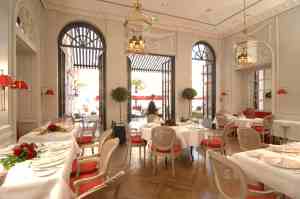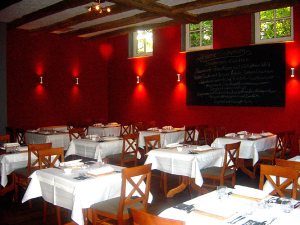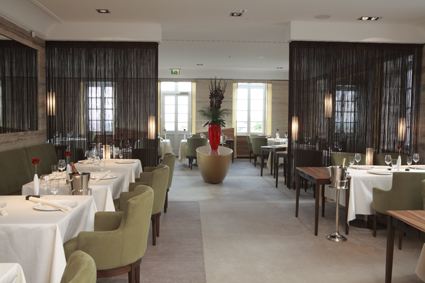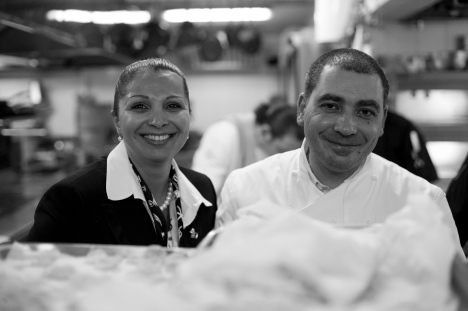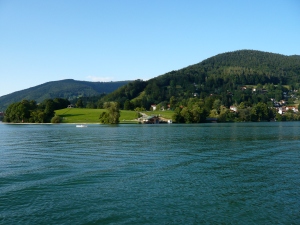Before I try to write about today’s German Fine Dining some comments on the history of Fine Dining in Germany are necessary. Why? Because it is hard to understand recent developments without knowing the roots.
A Brief History of German Fine Dining (until WWII)
German cuisine stands for a wide variety of very distinct regional specialties from Hax’n and Weißwurst in Bavaria, Spätzle and Rostbraten in Swabia (see below) to Sauerbraten in the Ruhrgebiet and Schinken, Aale, Hering, Sauerkraut, Kutteln, Spargel, Kohl etc. you name it.

Rostbraten mit Spätzle
The interesting question, though, is whether Germany has its own tradition in Fine Dining. Without going into much details it is fair to say that in the until the 17th and 18th century German Fine Dining was reserved to the nobility and very much inspired by French courtly feasts. In the 19th centure Prussian parsimony ruled until the economy began to prosper from 1871 onwards (“Gründerzeit”). At the end of the 19th century French influence was re-installed as Kaiser Wilhelm hired Urbain Dubois and Emile Bernard as courtly chefs.
Nevertheless, in 1822 the art historian Karl Friedrich von Rumohr condensed his thoughts about fine dining and cooking in his “Geist der Kochkunst” which is frequently named along Brillat-Savarins “Physiologie du goût” as one of the leading gastro-philosophical works (“Gastrosophie”) . Rumohr was a vigorous opponent to gluttony and a very precise thinker about the culinary arts, dining culture and food in general. His influence, however, is less practical and more theoretical than Brillat-Savarin, yet there is a recipe for “Veal Kidneys a la Rumohr” which Eckard Witzigmann turned into “Veal Sweatbread Rumohr” in the early 80s.

Karl-Friedrich von Rumohr (1785-1843)
In the early 20th century there have been very important German chefs who shaped German Fine Dining, namely Alfred Walterspiel and Gustav Horcher. Walterspiel became chef de cuisine in the Hotel Atlantik in Hamburg at the age of 29 and bought the internationally renowned Berlin restaurant “Hiller” from Louis Adlon in 1912. Unfortunately this was closed during the first world war by the Wucheramt due to inopportune luxury. In 1926 Walterspiel (together with his brother Otto) bought the Hotel Vier Jahreszeiten in Munich whose restaurant was named after him until 1995. His book “Meine Kunst in Küche und Restaurant” still is a standard in every cookbook collection. Horcher, on the other hand, created a unique style of service in his restaurants (including the famous stool for the handbag of a lady frequently encountered these days around the globe). The restaurant Horcher in Madrid still carries on the family tradition. Especially in the “Golden 20s” Berlin and its restaurants was highly regarded in Europe. As the Michelin was not international these days Germany does not have dynasties such as the Maison Troisgros or Maison Pic which was for sure exacerbated by the two world wars.

Walterspiel: Fine Dining in the 20s
After the second world war Germany was economically too weak to generate great chefs because there was simply no demand. In the mid to late 60s the Wirtschaftswunder again created some demand for Fine Dining. But, most restaurateurs did not return to Walterspiel’s or Horcher’s recipes or principles but instead ate a lot in the Elsass (at Haeberlin) and then sent their children to France for training. So, Germany was first under French influence, then shortly developed a German approach to Fine Dining, lost it and then imported French and international cuisine again.
Sources (any comments are welcome):
- Jean Claude Bourgueil: “Typisch Deutsch“, Edition Port Culinaire (the relevant parts can be found here)
- Interview with Gerhard Bauer an expert of culinary history in the Küche Magazin
- Hauer, Thomas M.: “Carl Friedrich von Rumohr und Der Geist der bürgerlichen Küche“, Dissertation University of Karlsruhe, 2000
First Generation: Import of French Haute Cuisine
One of the first Michelin stars was awarded to Franz Keller’s “Schwarzer Adler” in Oberbergen (Kaiserstuhl region) in 1969. His son, Franz Keller jun. has worked with for Ducloux, Bocuse, Lacombe and Gérard and was awarded even two stars at the Schwarzer Adler and later in Cologne (Restaurant Franz Keller). Another notable example is the Erbprinz in Ettlingen near Karlsruhe where patron Helmuth Gietz and chef de cuisine Günther Wanka created German Haute Cuisine with French products and techniques. On the other hand, Rudolf Katzenberger (patron of another “Schwarzer Adler” in Rastatt) used local products and created very unique specialties among them the famous Badisches Schneckensüpple (snail soup).
But, international recognition did not come until the Munich property developer Fritz Eichbauer “created” Tantris in 1971 (with then pathbreaking interior, now rather retro) and hired a young unknown but aspiring Austrian chef named Eckard Witzigmann which Paul Haeberlin had recommended to him. Witzigmann had been working for Bocuse, Troisgros and Haeberlin and was absolutely obsessed with product quality. He immediately got one star in 1971 and in 1979 was awarded three Michelin stars (as one of three chefs outside of France) at his own restaurant Aubergine which he had just opened the year before. Witzigmann is most important to the development of German Haute Cuisine as he was its spearhead and trained a lot of today’s great German chefs, among them Harald Wohlfahrt (Traube Tonbach***), Hans Hass (now at Tantris**), Johan Lafer (Stromburg*) and Alfons Schuhbeck (Schubecks Südtiroler Stuben*), the two most widely known TV chefs in Germany. Witzigmann was inspired by French Nouvelle Cuisine but created new dishes which are considered modern classics. His techniques, e.g. for roasting chicken, are still widespread.

Eckart Witzigmann - The Father of the German "Küchenwunder"
Heinz Winkler (also at Bocuse in 1978!) became the successor of Witzigman at Tantris in 1978 and got three stars in 1981 as the then joungest chef ever. He held three stars at Tantris from 1981 – 1991 and became owner of the Residenz in Aschau where he holds three stars since 1993 (with a two year “break” in 1996 and 1997). Among his disciples were Claus-Peter Lumpp (Bareiss***), Heinz Beck (La Pergola, Rome***), Christian Jürgens (Seehotel Überfahrt since July 2008, previously Burg Wernberg**) and Claudia Poletto (Poletto*) one of the only female top chefs in Germany. Winkler’s cooking has nor changed much in the last 10-15 years but his Cusine Vitale does not seem to be outdated. Solid preparations and good produce are still key. In my opinion the weakest of the three stars in Germany and risks downgrading if nothing changes.

Winkler: Cusine Vitale - Still Alive
Second Generation: Refinement and Perfection
After the “first generation” with their French roots the next generation of top German chefs were mainly trained in Germany and thus adopted and further refined French style cooking. Most importantly, Harald Wohlfahrt was hired by Heiner Finkbeiner in 1978 first a a sous chef and then took over the restaurant Scharzwaldstube at Hotel Traube Tonbach in 1980. He holds three stars since 1992 and is regarded as the best German chef together with Joachim Wissler (see the Volkenborn ranking) as well as one of Europe’s best. Classic on the outset Harald Wohlfahrt is best in producing “simple” dishes with mind-blowing taste – one immediately gets the feeling that there is no way of doing it better. Remarkably Wohlfahrt continuously improves, modernizes and perfects his dishes and is (together with Wissler) a little ahead of this peers…

Wohlfahrt: Reduced to Maximum Taste
Wohlfahrt was the single most influential chef for German Fine Dining after Witzigmann had to close Aubergine due a little cocaine scandal in 1993. Many of his disciples were very sucessful afterwards: Joachim Wissler, Christian Bau and Klaus Erfort (all three stars), Thomas Bühner (La Vie**) and Hans-Jörg Sackmann (Sackmann*) and lots of others.
Almost of equal importance was Dieter Müller: born in Baden in a gastronomic family he learned Haute Cuisine from Ernesto Schlegel at the Schweizer Hof the then best restaurant in Switzerland. After a stint in Korfu his brother Jörg called his support at the Schweizer Stuben in Wertheim-Bettingen. Together they run the Gourmet restaurant earning the first star in 1974, the second in 1977 and were regarded equal to Tantris as Germany’s top restaurant. After Jörg left, Dieter stayed in Wertheim until 1990 but without being promoted to three stars (the Gault Millau awarded 19.5 points for the first time in Germany). After two years of renovation at Schloßhotel Lerbach he opened his Gourmet Restaurant “Dieter Müller” which holds three stars since 1997. Among his disciples were Nils Henkel (who took over the restaurant in February this year) and Sven Elverfeld.
Dieter Müller is a master of sauces of astonishing intensity which lift his technically perfect dishes to another level. His cuisine has classic roots but is very open to adding in international flavours especially from Asia. Harmony is very important.
The creation of a lunch menu consisting of 19 amuse bouche portions was ingenious as it guaranteed an uptake in lunch bookings and enables the diner to familiarize with his cuisine. Warning: not advisable for foodies, however, as the portions of the mostly complex dishes are too small to fully grasp all details;-)

Müller: Ingenious Amuse Bouche Lunch Menu (thanks to ulterior epicure)
In this generation Helmut Thieltges also needs to mentioned – with no big names on his CV he took over his family hotel and restaurant Waldhotel Sonnora in 1978 and quietly refined his very product-centered cuisine to three star status.

Thieltges: Best Products and Most Precise Execution
Third Generation: Emancipation towards a “New German Cuisine”
Given this background and the reputation of German Fine Dining to be classic with some individual touch what changed? In my opinion there are several developments which contributed to a foundation to a “New German Cuisine”:
- Chefs’ emancipation. After mastering the classic repertoire and using this a solid basis some young chefs began experimenting to develop a personal handwriting surely fueled by some stimulation from all over the world. Klaus Erfort, for example, said he continuously simplified his dishes by getting rid of unnecessary elements and abiding with “variations of…”. “It just happened” – there was no master plan.
- “Rediscovery” of German products. Traditionally German top chefs used the usual suspects like Brittany lobster and turbot, lamb from the Pyrenees, Atlantic sole, etc. In recent years some superb products of German origin made their way on the menus, e.g. Müritz lamb from the former TV journalist Klaus Schwagrzinna, Schwäbisch-Hällisches Landschwein (a premier pork quality), Bœuf de Hohenlohe and herbs from the Essbaren Landschaften to name just a few. Joachim Wissler was one of the first to reintroduce pork at three star level. Yes, there is some way to go but it’s moving in the right direction. Especially for the lower end of fine dining I continuously advocate the use of local products to differentiate form the high-end and become economically more viable.
- Increased public interest in higher-quality cooking and dining. From a rather homogeneous group of fans of simple cuisine (“gutbürgerlich”) there has been some “market segmentation”: On the one hand, some people are increasingly interested in healthier nutrition (mega trend health!) and more natural ingredients (hormone scandals!), do cook more (fueled by those TV chefs) and tend to dine out more. Interestingly, this is not restricted to the wealthy but encompasses also normal middle-class households who save their money to dine 2-3 times in a starred restaurant (like Heston Blumenthal who sold his car to eat at the best restaurants). On the other hand people don’t cook any more and are frequent visitors to fast food chains.
Let me now introduce you to some of the protagonists:
On the forefront of developing a German approach to Fine Dining is clearly Joachim Wissler. When he got his third star in 2005 his cooking was rather classic but made a huge leap forward in recent years. Now he is internationally regarded as one of the best chefs in the world (see the first review on Lo Mejor and the highest new entry on the Pellegrino list at rank 34). His cuisine is the most intellectual in Germany using the whole spectrum of techniques and continuously pushing the frontier. Wissler was recently voted best chef in Germany his Top100 peers.

Wissler: Technical Mastery and Continous Evolution
Juan Amador is the most vanguard cook these days in Germany. At his Restaurant Amador in Langen near Frankfurt he received the third star in November 2007. Equipped with excellent cooking skills he is a master in creating new taste sensations by combining very unusual flavours and using modern culinary techniques to enhance the dish where necessary. This third star is surely a landmark for the further development in Germany as now young chefs should be eager to develop their own handwriting off the beaten track.

Amador: Spanish Avantgarde Perfected
Christian Bau also got rid of the chains of his master Wohlfahrt – his cooking is complex, refined, tasty and just pure fun using the best products available. There is an immense potential…

Bau: Modern French Cusine with Complex and Intense Flavours
Klaus Erfort is the last of the Wohlfahrt school who earned three stars in 2007. He made a quantum leap from 2005 to 2007 – from playful overloaded plates to reduced and intelligent dishes where only a limited amount of flavours are pulling the strings.

Erfort: Continuous Simplification
Sven Elverfeld has emanzipated himself completely from Dieter Müller and is very modern with respect to new and very creative interpretations of international and German classics. He should get his third star soon.

Elverfeld: Structuralistic, Innovative and Perfect Harmony
Last, but not least, Dieter Müller’s successor Nils Henkel is currently paving his way to modernize the cuisine in Lerbach – not yet visited, but hopefully soon… And, there are more: Thomas Bühner, Christian Jürgens, Christian Lohse, Thomas Kellermann, and the formidable Michael Kempf among others…
In the end, the question is whether there really is ONE “New German Cuisine”? Given the quite different styles I would rather say there are different interpretations – go and see yourself! Everyone is definitely worth a visit – hopefully my forthcoming reviews of recent visits will be helpful to guide you a little bit. Moreover, I hope to discover some raw diamonds…
***UPDATE Nov 2008***
Third star for Sven Elverfeld as I predicted;-) Very well-deserved for his quite unique and witty style of modernizing German classics and playing with childhood memories. A new report will come up soon – I promise!
Loss of third star for Winkler again as I predicted;-) Nevertheless, Heinz Winkler is one of the great chefs in Germany until now and held three stars for 22 years which is unique outside of France. He already gave an interview Terminator-style “I’ll be back!”.
Christian Jürgens took his two stars to the Seehotel Überfahrt – a rare event when Michelin just “transfers” the stars. There will be more to hear from this very talented chef…
With respect to the other three new two star chefs I will visit them soon – Wolfgang Becker in Trier is up this weekend, then Leipzig where Claus-Maria Schnurr is cooking at Falco and finally Christian Grünwald at August in Augsburg.


